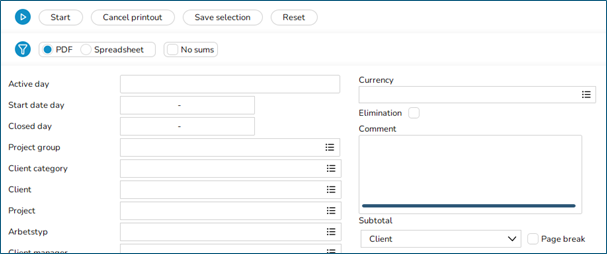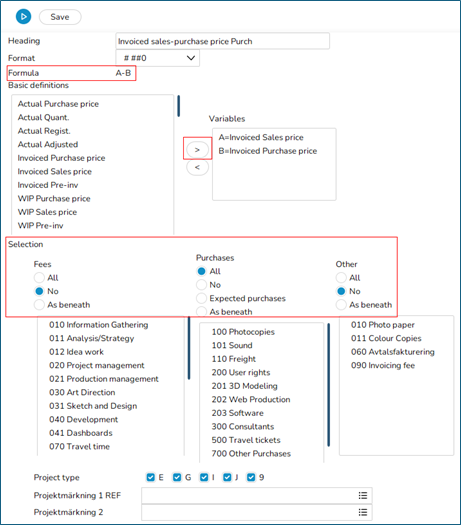Reports
From Marathon Documentation
Contents
Reports
Reports can be printed out and created in Projects | Reports.
General
| New | Use for creating new report template. |
|---|---|
| Edit | Use for editing existing report templates. |
| Printout | Select a report and press Printout. You can also double click on a report to print it. |
| Data definitions | Button for creating or editing own definitions in the report. Read more in separate chapter. |
| Copy company | You can copy reports from another company. If you have own reports, they will be replaced with the company’s that you copied from. Keep in mind that not all reports are global, i.e. only the person who created the report can use it. |
Print report
- Select the report and press Printout or double click on it.
- Make a printout selection. The selection view varies depending on what settings has been made in the report template.
Press Start.
| Cancel printout | Use if you want to cancel the printing process. |
|---|---|
| Save selection | This function saves the user’s selection. |
| Reset | Resets the saved selection. |
| Prints the report in Pdf format. | |
| Spreadsheet | Prints the report to Excel. |
| No sums | Prints to excel with or without subtotals. |
| Currency | Used to print the report in a currency other than the company's base currency. |
| Elimination | Used only in companies using the multiple currency system. |
| Comment | A comment that will be printed out under the report heading. |
| Subtotal | Select subtotals for the report. |
| Sorting | Select column for sorting. |
| Reversed | Presents the highest values on the top. |
Create report
- Press New to create a new report.
New report template
- Click on the heading New report template and give the report a name and a heading.
- Select a standard setting for subtotals; it can be changed at printout.
- Click on New column
New columns
You can change the size of the columns and move them by dragging the column heading.
- Press the New column button.
- Select Data definitions. There are some standard definitions already, but you can add more, see later chapter in this manual.
- Change suggested heading, if you wish.
- Choose format for balance presentation:
# ##0 Integrals
# ##0,00 Amounts with decimals
1000 Thousands
NAME E.g. the project manager
CODE E.g. the project manager code
- If a certain period always shall be shown in the column, enter it here.
Acc accounting year shows the balance for the current year. Previous year shows the balance from previous year.
- Use Operator for calculations. It can be used for both columns and data definitions.
- You can make a selection for the column.
- Save the column with OK button. Make new columns if you wish.
- Click the Format button to make the report landscape or portrait so that all columns fit.
- Resize columns and move them by grabbing the column header.
Format and selection
Decide how the report should be presented and the selection screen when printing.
- Set Format to portrait or landscape.
- Choose selection that will be suggested.
| Show periods | Dissenting periods shows periods in columns where periods are available.
All shows selected period in all columns No doesn’t show periods in columns |
|---|---|
| Global | A global report allows all users with authorisation to reports to use this report. |
| Authorisation group | If the report is made global, you can select an authorisation group for it. |
| Size | 100 % is automatically suggested. |
| Copy from | Here, existing reports within the company can be copied. |
New data definitions
There are a number of standard definitions that can be used in the report columns, and you can also add your own definitions.
- Click on Data definition and select New.
- Select Basic definitions and click on the right arrow so that the basic definition is shown in the box Variables.
- You can select more basic definitions, and Formula +-* | % to calculate basic definitions
- Select format for balance presentation.
- Choose Selection for Fees, Purchases. Select Project type and optional Project label.
- Write a clear heading.
- Save. The new data definition can now be fetched into a report template.
Report definitions
| Actual p-price | Registered purchase price. For purchases, it means the price before mark-ups, for fees, the calculated cost of the employee and for other it is the purchase price stated on the code. |
|---|---|
| Actual Amount | Number of registered entities |
| Actual Registered | Registered sales price. For purchases it means the price before mark-up and for fees, the hourly price. |
| Actual Adjusted | Adjusted entries |
| Invoiced p-price | Like Actual purchase price, but only entries that are invoiced. |
| Invoiced s-price | Like Actual registered, but only entries that are invoiced. |
| Pre-invoiced | Pre-invoices |
| WIP purchase price | Like Actual purchase price, but only entries that are not invoiced. |
| WIP Sales price | Like Actual registered, but only entries that are not invoiced. |
| WIP Pre-invoiced | Pre-invoices that haven’t been deducted. |
| Project estimate Hours | Estimated hours on the project |
| Project estimate Amount | Estimated amount on the project |
| Project estimate p-price | Estimated purchase price. See Actual p-price for definition. |
| Regular price/hour | The employee’s regular hourly price set in the employee register in base registers. |
| Regular working time | The employee’s work time requirement in Time report. |
| Fixed price | A fixed price set on the project |
| Not updated hours | Backoffice | Transactions | Update WIP |
| Resource planned time | Hours that are resource planned |
| Collective client manager | Client manager that is registered on the collective client in the base registers |
| Client manager | Client manager that is registered on the client or the project |
| Project manager | Project manager that is registered on the project |
| Production manager | Production manager that is registered on the project |
| Master | The master project that is connected to the project |
| Project type | E = external, I = internal, 9 = Not project related (900-codes), J = Speculative job and G = group common |
| Project status | 0 = active, 9 = closed, 8 = pending |
| Project group | The group that is connected to the project |
| Created | Date when the project was created |
| Last entry | Shows date for last registered entry |
| Filing number | Filing number registered on the project |
| Archiving status | J If the project is archived, N if not |
| Filing date | Date for archiving the project |
| Closed | Closing date for the project |
| Latest invoice is paid | Payment date of the last paid invoice |
| Team | The project’s team |
| Deadline | Deadline date, registered on the project |
| Start date | Start date of the project, registered on the project |
| VAT code | The VAT code of the project |
| Comment | Time reporting |
| Own ID | Registered on the client |
| Reporting-ID | Registered on the client |
| Intercompany code | Registered on the client |






